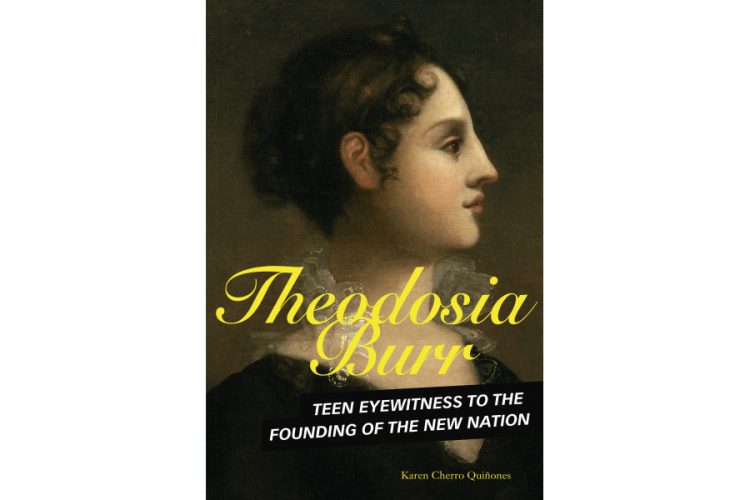Author Karen Cherro Quiñones on Theodosia Burr: Teen Eyewitness to the Founding of the New Nation

by Shaina Olmanson, Associate Editorial Director for Twenty-First Century Books and Zest Books
Theodosia Burr is the daughter of Aaron Burr, a former vice-president, lawyer, colonel, and controversial killer of Founding Father Alexander Hamilton.
A notable part of the acclaimed Hamilton musical was its attention to the women who lived alongside the Founding Fathers. The musical brought the Schuyler sisters into the spotlight of the nation’s history. However, Theodosia did not have a role in the musical, though she is mentioned in two of the musical’s songs, including “Dear, Theodosia” where new fathers Burr and Hamilton share their hopes for their children.
Aaron Burr is pushed to the background of the American Revolution with his fame coming mainly from his time as vice-president and his duel with Hamilton, and his family is even less known. However, Theodosia Burr: Teen Eyewitness to the Founding of the New Nation provides a closer look at Burr and Theodosia’s relationship, her education, and Burr’s contributions to the development of America. Theodosia was a remarkable woman whose life showed that women are capable and deserving of an education. She stood out, with an education that rivaled that of a man of those times, though she gracefully fulfilled the post-revolutionary expectations of a woman.
Author Karen Cherro Quiñones on writing Theodosia Burr
Why Theodosia? What stood out to you about Aaron Burr’s daughter and gave you the idea to write this book?
I was intrigued by the story of a teenage girl growing up differently from other girls at a time when roles were very strictly defined. As the daughter of a well-known, powerful man, her place in 18th century life was defined before she was born. Theodosia was an exception. It seemed to me to be a story that teens and adults would be able to relate to today.
What was the most surprising thing you learned in the course of your research?
- Theodosia’s formal dinner for Iroquois Chief Joseph Brant. I just can’t imagine doing something like that around the time I turned 14. I was taking etiquette classes and struggling to master the basics of polite society. Theodosia had already mastered them in addition to the political subjects that would have been discussed at dinner.
- The depth of emotion expressed between her husband, Joseph Alston, and her father when her ship did not arrive in NY as planned. I knew it must have been emotionally draining for them, not knowing where she was and, ultimately, accepting the fact that they would never see her again. But I don’t think it was a reality to me until I read their letters. I found myself stopping periodically and walking around the library to relieve myself of the sadness. I didn’t expect men to so readily express their suffering to each other.
Was there anything you wished you could have included but didn’t have the space or the documentation to support it?
Yes, I would have liked to include more of her life after she married and moved to South Carolina, especially her difficulty fitting in with southern culture of the time. Also, her reaction to her father’s duel with Alexander Hamilton, Burr’s trial, and subsequent exile in Europe. I included some of this but the story is focused on her experiences as a teen.
What do you hope readers will take away from this book?
I hope the book inspires readers to have the confidence to be who they are in the face of pressure to conform. If Theodosia was able to do it in the confines of late 18th/early 19th century society, we can do it today. Like her, reach out to find the people who appreciate, encourage, and welcome your uniqueness!
Many thanks to editorial intern Jesseca Fusco for her help drafting this post.
Comments
I can’t wait to read about Theodosia!!